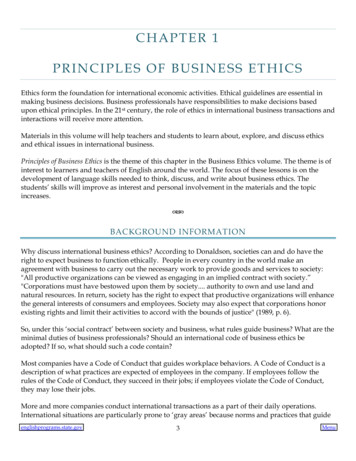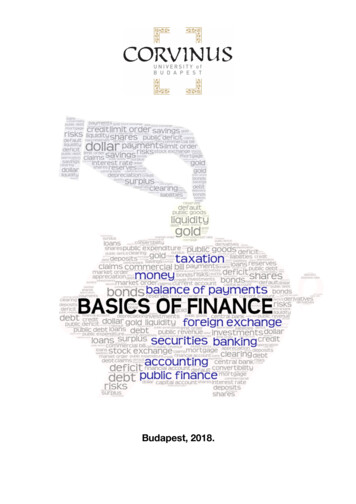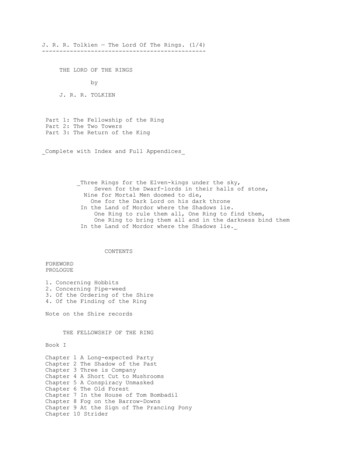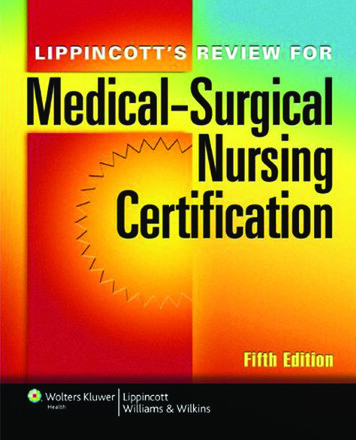
Transcription
CHAPTER 1PRINCIPLES OF BUSINESS ETHICSEthics form the foundation for international economic activities. Ethical guidelines are essential inmaking business decisions. Business professionals have responsibilities to make decisions basedupon ethical principles. In the 21st century, the role of ethics in international business transactions andinteractions will receive more attention.Materials in this volume will help teachers and students to learn about, explore, and discuss ethicsand ethical issues in international business.Principles of Business Ethics is the theme of this chapter in the Business Ethics volume. The theme is ofinterest to learners and teachers of English around the world. The focus of these lessons is on thedevelopment of language skills needed to think, discuss, and write about business ethics. TheVWXGHQWV· VNLOOV ZLOO LPSURYH DV LQWHUHVW DQG Sersonal involvement in the materials and the topicincreases.ZYBACKGROUND INFORMATIONWhy discuss international business ethics? According to Donaldson, societies can and do have theright to expect business to function ethically. People in every country in the world make anagreement with business to carry out the necessary work to provide goods and services to society:"All productive organizations can be viewed as engaging in an implied contract with society µ"Corporations must have bestowed upon them by society. authority to own and use land andnatural resources. In return, society has the right to expect that productive organizations will enhancethe general interests of consumers and employees. Society may also expect that corporations honorexisting rights and limit their activities to accord with the bounds of justice" (1989, p. 6).6R XQGHU WKLV ¶VRFLDO FRQWUDFW· EHWZHHQ VRFLHW\ DQG EXVLQHVV ZKDW UXOHV JXLGH EXVLQHVV" :KDW DUH WKH minimal duties of business professionals? Should an international code of business ethics beadopted? If so, what should such a code contain?Most companies have a Code of Conduct that guides workplace behaviors. A Code of Conduct is adescription of what practices are expected of employees in the company. If employees follow therules of the Code of Conduct, they succeed in their jobs;; if employees violate the Code of Conduct,they may lose their jobs.More and more companies conduct international transactions as a part of their daily operations.,QWHUQDWLRQDO VLWXDWLRQV DUH SDUWLFXODUO\ SURQH WR ¶JUD\ DUHDV· EHFDXVH QRUPV DQG SUDFWLFHV WKDW JXLGH englishprograms.state.gov3Menu
ethical behaviors vary across cultures. The ethical decision about what to do in some internationalEXVLQHVV VLWXDWLRQV LV QRW DOZD\V FOHDU 6RPHWLPHV D GHFLVLRQ DERXW HWKLFV LV QRW ¶EODFN RU ZKLWH · EXW LV LQ WKH ¶JUD\ DUHD· ,Q WKLV FKDSWHU D GHVFULSWion of a dilemma that requires discussion aboutinternational business ethics is presented.ZYMost experts in international business ethics agree that an international code of ethical practice, andQRW D FRGH EDVHG RQ HDFK LQGLYLGXDO FXOWXUH·V XQLTXH QRUPs and practices, is essential to globaleconomic survival in the 21st century.Experts have created a list of principles to guide international business ethics. These principles aresummarized here:Principles of International Business Ethics 11. Integration² Business ethics must permeate all aspects of organizational culture and bereflected in key management systems. Companies start by integrating ethics into goalsetting and hiring practices. When promoting workers to higher levels within thecompany, ethical principles guide incentive programs.2. Implementation² Ethical conduct is not just an idea, but requires the implementation ofa plan of change in specific areas of work in the company. Some examples are efforts tomodify personnel appraisal processes, promotion of improved environmental practices,and referrals to specialists, when needed.3. Internationalization² Increased internationalization is necessary to all successfulbusiness in the 21st century. Internationalization is achieved through the formation ofinternational partnerships, trading blocs, and implementation of GATT and other freeWUDGH DJUHHPHQWV &ODULILFDWLRQ RI DQ RUJDQL]DWLRQ·V RZQ GHILQLWLRQ RI LQWHJULW\ WKDW transcends national borders is necessary. A resulting program is not culturally definedand requires little or no modification when applied in global contexts.ZYCLASSROOM APPLICATIONSLanguage classes are places in which interesting activities and discussions can lead to betterunderstanding of ethics in business. In order to understand the importance of principles in businessethics, students work together using materials that are valuable for learning and interesting.ZY1Adapted from the International Business Ethics Institute and the Caux Roundtable on Moral Capitalism at Work4
PRELIMINARY LESSON PLANNINGMaterials:xxxxxPrepare copies of these for all students: Principles of International Business Ethics andCase Studynewsprint, poster board or other large papermarkersLearning Groups:Though individualized assignments and tasks can be effective learning contexts, research shows thatclassroom interaction on topics of high interest results in more learning and a better understanding ofthe content. The teacher makes decisions about how to best organize the learning experiences forstudents in the classroom.Student groups are important for classroom learning. Students may be grouped in pairs, smallgroups (4- 6 students per group), half- class or whole class. Teachers may allow students to groupthemselves, or teachers can arrange the groups. Whatever the grouping scheme, how studentsinteract ² with whom, on what topics, and for how long ² is an important aspect in planning a lesson.Variety of experiences is the key to effective learning in the classroom acquisition of language.Vocabulary and Grammar:Review readings and determine vocabulary and grammar points to be addressed. See AppendixA for a sample grammar review.ZYWARM UP ACTIVITY(approximately 15- 20 minutes)Goals:xxxxTo involve students in the topicTo teach new vocabularyTo gain background information on the topicTo create an atmosphere of trust to discuss a sensitive and very important topicProcedures:1. Warm up for Activity #1: Write a Code of Conduct for your school or company.2. 7HOO VWXGHQWV WKDW WRGD\·V OHVVRQ ZLOO EH RQ WKH JHQHUDO WRSLF RI %XVLQHVV (WKLFV ZLWK the focus on Principles of Business Ethics. Tell students that when they have finishedthe lesson, they will have done the following:a. discussed and written a little on this topicenglishprograms.state.gov5Menu
3.4.5.6.b. learned information on the topic that they did not previously haveWrite on the blackboard "Principles of International Business Ethics."Ask students to share what they understand about Principles of InternationalBusiness Ethics. A pair of students (or the teacher, if necessary) records studentresponses on an overhead, blackboard or flip chart. Retain this record of studentresponses for later use (Step 5 and afterward)Teacher summarizes student responses focusing on key words used in the recordingof those responses on overhead, blackboard or flip chart.(Note: If proficiency and confidence and trust are high, a student might be asked tovolunteer to do the summary. Choose a different student from those who may haveearlier recorded student responses.)Have students complete Handout #1: Self Assessment on International BusinessEthics. Discuss their responses. Listen to what students say to get a sense of whatthey understand and know about this topic. Reminder: This is a warm up.However, Handout #1 can be used for a lesson extension if the teacher so desires.Transition from Warm up to Activity #1 ² Now, tell students that they will addressthe topic of the day ² to learn about Principles of International Business Ethics.ZYACTIVITY #1 ² WRITE A CODE OF CONDUCT(approximately 40- 45 minutes)Goals:xxxTo use English in meaningful waysTo introduce Principles of International Business EthicsTo provide meaningful contexts for using new vocabulary and (often somewhat under- used) grammatical structuresProcedures:1. Have students read the Principles of International Business Ethics.2. Have each student or group of students select one principle to describe in a paraphrase.Then, have students think of an example of a situation where this principle mightapply. For example, students choose integration as the principle to discuss. Aparaphrase of Integration might be this: A code of conduct must be obvious in allaspects of business operations. For example: When a candidate is interviewed for a job,the interviewer refers to ways in which the position requires ethical behavior, asdefined by the Code of Conduct. Or, when goals are set for the year, the company vice- president outlines how goals might conflict with the company code of conduct andways of avoiding those conflicts.englishprograms.state.gov6Menu
3. Present an introduction to the activity. Say "Now, we see the role and importance ofethical behavior in international business. A "Code of Conduct" is a starting point forbuilding a plan for ethical behaviors in a business. In the next activity, we are going toZRUN LQ JURXSV WR GHYHORS D &RGH RI &RQGXFW (DFK JURXS·V &RGH PXVW DGKHUH DV PXFK as possible to the three Principles of International Business Ethics." (10 minutes).4. In each group, there are two Scribes (they write down the comments made in the groupdiscussion), a Coordinator (this person assures that the discussion stays on the topicand that all participants have their views heard) and two Proofreaders (theseindividuals are responsible for the final draft that will be shared with the class later on).Note: This scheme can be adjusted, depending on the size and needs of the group.However, for maximum effectiveness, all students should be assigned a role for thisactivity.5. In each group, ask students to please follow these steps (15- 20 minutes):a. Read through and make sure you understand the Principles. Ask the teacher if youneed more information or clarification.b. Review sample Codes of Ethics or Codes of Conduct from several professionalgroups at this web l/index.htmlc. Now, write a Code of Conduct for your school or company. Use the format providedin Handout #2. The Coordinator generates ideas;; and the Scribes write the list on a largepiece of newsprint, poster board or other large paper (preferably, with wide markers).d. The Proofreader checks the Code and is responsible for finding mechanical (spelling,grammar, capitalization and formatting) errors. Note: See Appendix A for a briefgrammar review.6. 7DSH HDFK JURXS·V &RGH RI &RQGXFW WR WKH EODFNERDUG PLQXWHV7. Invite the class to read through each Code. Encourage students to discuss their CodesZLWK HDFK RWKHU DV WKH\ ZDON DURXQG WKH URRP UHDGLQJ HDFK JURXS·V &RGH ([SODLQ WKH rationale, and describe how each principle is represented in the Code. (15 minutes)8. Finally, the teacher gives feedback on the Code, referring specifically to the mechanics(see the grammar section in Appendix A for specific points on which to providefeedback) and the content. (Focus here is on how and to what extent that studentV· Codes of Conduct address the Principles of International Business Ethics).Note: Step 7 (above) represents the feedback/ assessment part of the activity, and is critical toproviding the teacher with data on the extent to which students have achieved the objective(s) ofa lesson. Alternative feedback/assessment tools might be considered. Step 7 is one option.ZYenglishprograms.state.gov7Menu
ACTIVITY #2 - READ AND EVALUATE THE CASE STUDY(Approximately 20- 30 minutes)GoalsxxxxTo use English correctly in meaningful waysTo describe gift- giving practices and the ethical implications of those in internationalbusiness settingsTo improve vocabulary skillsProcedures:1. Warm up for Activity #2: Discuss gift- giving practices, since those are carried out in theVWXGHQWV· ZRUN RU VFKRRO HQYLURQPHQW 2. Teacher describes a gift- giving or gift- receiving experience he/she has had. Then, theteacher solicits ideas from the students. For example, the teacher asks: "What are theappropriate gifts for teachers in your school/ employees in your company?" Generate aclass discussion on this topic. Get students to talk about this, without making judgingcomments.3. Ask students to complete the Questionnaire on Ethics of Gift Giving (Handout #3).4. Tell students that they will read through a description of a real- life situation in whichgift giving is the subject of ethical judgment.5. Do a round robin reading of the Case Study (Appendix B).Note: In a round robin reading, each student has a copy of the text and reads oneparagraph followed by the next student reading the next paragraph, until all studentshave had the opportunity to read once. Teacher correction here is on readingcomprehension.6. Now, check for understanding. Make sure that students understand the short CaseStudy. See Handout #4 for a list of questions for students to answer (either in pairs,groups or individually). Give instructions for multiple choice and readingcomprehension assessment. Ask students to read the questions first and then to re- readthe passage.7. Solicit responses from students using their answers to the comprehension questions.Then, provide correct answers. Make certain students understand the case study.Note: If students GR QRW VHHP WR QHHG WKH FRPSUHKHQVLRQ ¶WHVW · RPLW Handout #4 andgo on.8. Now, do Handout #3: Questionnaire on the Ethics of Gift Giving. Ask students toGLVFRYHU WKHLU RZQ DQG RWKHUV· DWWLWXGHV WRwards gift giving.Note: Teacher may or may not wish to summarize student responses to theQuestionnaire at this point.9. Write a Code of Conduct for International Gift Giving for the class. Include a list ofrules for gift giving based on the Principles and addressing the topic as it relates to theacademic and/or professional contexts of students in the class.englishprograms.state.gov8Menu
COOL DOWN ACTIVITY(Approximately 10- 15 minutes)Goals:xx7R EXLOG RQ DQ DWPRVSKHUH RI WUXVW DQG UHVSHFW IRU RWKHUV· LGHDVTo close the lessonProcedures:1. Summarize what we have done. Be certain to include another verbal listing ofthe Principles of International Business Ethics.2. Ask students to choose one of the Principles and discuss a way in which he/she mightaddress it in his/her work/school life.3. Ask why gift giving is an important subject for international business professionals toaddress.4. Finally, ask students to say what they would like to know more about concerninginternational business ethics.ZYLESSON EXTENSIONSWays of Expanding on Activity #1:Teachers might want to expand on this activity by asking students to share their Codes with others(outside the class). This can be done by encouraging students to engage in authentic electronicexchanges. Try these web sites for starters:http://eslcafe.com'DYH·V (6/ &DIphttp://onlineethics.org/Online Ethics Center for Engineering and ScienceStudents can write comments to the web site owners and ask for responses. Note: Students are verylikely to receive responses! Possibilities abound for extending these electronic interchanges betweenyour students and website owners!Possible Ways of Expanding Activity #2:englishprograms.state.gov9Menu
Students might use the questions in Handouts #1 and #3 to conduct a survey of 20 or moreindividuals in the community. Tally the results and create a graph and interpret it.INTERNET RESOURCESThe Internet resources listed below provide useful information to those wishing to know more aboutwhistleblowing. The sites marked with an asterisk (*) point visitors to other web sites on the same topic.xhttp://www.whistleblowing.orgBlowing the WhistleThis site is the only electronic communication tool by and for those who are actualwhistleblowers. Staffed by a father and son team of whistleblowers (one in industry, the otherin government), this site will generate good class discussion on the world of whistleblowingfrom the real- world experiences of two tline/smoke/index.htmlSmoke in the EyeAn interview with executives in the tobacco industry, this report provides a model for strategiesused by businesses to protect their own interests with the public and on camera. Interestedstudents can use this material for several possible classroom activities (and tasks outside theclassroom). For example, students might identify strategies these executives use and maypresent either a model for executives in a local company under suspicion for ethics violations,or students might provide a list of interview questions for an interview with an executive froma local company or government agency.xhttp://www.whistleblower.org/Government Accountability ProjectIn 1977 the non- profit Government Accountability Project was created to help whistleblowers.The site has specific examples of whistleblowing, which can be used as discussion topics, andprovides links to other whistleblowing sites.ZYenglishprograms.state.gov10Menu
APPENDIX AGrammar Overview Some Useful Rules and Ways of Using Them to Discuss International Business EthicsThe grammar rules that appear below may be of help to students and teachers in identifying areas ofaccuracy in grammar usage. Other grammar rules will be presented in later chapters.Grammar Point #1:Example Sentence from the text: See page 2: "If employees follow the rules of the Code of Conduct, theysucceed in their jobs; if employees violate the Code of Conduct, they may lose their jobs."This sentence is a good example of the use of the hypothetical conditional. We use this form frequently.Rule: Use an if clause to introduce the topic. After that, it is not necessary to repeat the if clause in everysentence. It sounds unnatural to keep repeating if.Grammar Point #2:([DPSOH 6HQWHQFH IURP WKH ZHE WH[W 6HH SDJH (WKLFDO FRQGXFW LV QRW MXVW µDQ LGHD ¶ but requires theimplementation of a plan of change in specific areas of work in the company."This sentence demonstrates the use of articles in describing a rule or principle. Notice the use of an, the anda. We use definite articles (the) to refer to what we have previously described and indefinite articles (a, an) torefer to ideas we want to introduce.(Back to Classroom Applications)(Back to Activity #1)ZYAPPENDIX BCase StudyGrady is the president of an engineering firm. The firm is negotiating a contract in anothercountry. The engineering firm has not previously worked in this country. A high-ranking official inthis country tells Grady that it is an established and legal custom to give personal gifts to officialswho are authorized to award contracts. This official also informs Grady that no further work will beDZDUGHG WR *UDG\¶V ILUP ZLWKRXW VXFK JLIWV RZHYHU WKLV FRQGLWLRQ ZLOO QRW EH LQFOXGHG LQ WKH contract. If Grady does not comply, the government will also be less cooperative in the completionof the first contract. Grady learns that other firms have given such gifts to officials.Adapted from NSPE Case and BER Judgment, summarizedat (BackBack to Classroom Activity #2)ZYenglishprograms.state.gov11Menu
HANDOUT #1Handout #1: A Self Assessment On International Business EthicsSA Strongly AgreeA AgreeNS Not SureD DisagreeSD Strongly Disagree BBB ,W LV EHWWHU WR DYRLG FRQGXFWLQJ EXVLQHVV RXWVLGH RQH¶V RZQ FRXQWU\ because of the complexities thatoccur across national borders.2. Ethics is a philosophical issue, not a business issue.3. In business, keeping a code of ethics is like keeping wedding vows. BBB ,W¶V EHWWHU QRW WR WKLQN DERXW HWKLFV ZKHQ \RX DUH PDNLQJ D EXVLQHVV GHDO 5. International business ethics is important to me.(Back to Warm- Up to Activity #1)(Back to Possible Extensions to Activity #2)ZYenglishprograms.state.gov12Menu
HANDOUT #2Handout #2: Code of Conduct for Use by XYZ School or CompanyPrepared by:(names of group members here)Code Of Conduct Statement:Description of rationale on the basis ofxPrinciple of Integration:xPrinciple of Implementation:xPrinciple of Internationalization:(Back to Activity #1)ZYenglishprograms.state.gov13Menu
HANDOUT #3Handout #3: Questionnaire on the Ethics of Gift Giving PracticesAnswer the following questions by yourself; then discuss them with your teacher or a partner.SA Strongly AgreeA AgreeNS Not SureD DisagreeSD Strongly Disagree1. There should be no international code of ethics on gift giving.2. Decisions about gift giving are best left to individual businesses.3. I prefer to have rules about gift giving provided for my use in international business.4. All businesses should be required to follow rules of ethical gift giving behavior.5. Business professionals in individual countries should not be required to adhere to international ruleson gift giving.(Back to Activity #2)(Back to Extensions )HANDOUT #4Handout #4: Comprehension Questions for use with Case StudyCircle the correct answer to each question:1. What happened to Grady?2.3.A. He was told to give a gift to an official.B. His wallet was stolen.C. The president of the company wanted a gift.D. He found out it was illegal to give gifts.What did the official say?A. Give a gift to the president.B. Give a gift to an official.C. Ask for payment when closing the deal.D. Bring a gift to a dinner with executives.According to the official, gift giving was consideredA. Ethical, but rarely done.B. Commonplace, but unethical.C. Polite, but not required.D. A matter of choice.(Back to Activity #2)ZYenglishprograms.state.gov14Menu
and ethical issues in international business. Principles of Business Ethics is the theme of this chapter in the Business Ethics volume. The theme is of interest to learners and teachers of English around the world. The focus of these lessons is on the development of language skills neede











